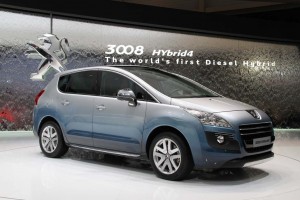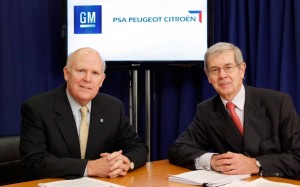
Despite the addition of new products like the 3008 diesel-hybrid, Peugeot continues to stumble as the European slump drags on.
After more than 200 years in control of the company that still bears its name, the Peugeot family appears willing to cede control of PSA Peugeot Citroen in a bid to attract a white knight to rescue the fast-failing French automaker.
And with several potential partners, including Chinese carmaker Dongfeng, showing a notable lack of interest, Peugeot CEO Philippe Varin is now sounding out General Motors, according to several reports from Europe. GM and Peugeot announced an alliance in early 2012 that the makers claimed would save them billions of dollars over the coming year through common purchasing, parts production and other efforts. But the proposal coming from the French maker would take things a significant step further.
Like Peugeot, GM has been hard hit by the European economic crisis and recently announced the latest in a series of turnaround plans for its Continental operations – which have lost more than $16 billion in 13 consecutive years of red ink – including $1.8 billion in 2012. But with European car sales now dipping to their lowest levels in two decades, analysts are skeptical about how quickly it will be able to implement that plan.
“GM faces the same overcapacity situation with Opel, and that’s why PSA is trying to convince them to merge the two,” said one of several sources who were quoted by Reuters, and who asked the news service not identify them because the talks are confidential. “The Peugeot family has now accepted that they’ll lose control, so this is no longer an issue.”
The Peugeot family got into business in 1810 to produce coffee mills – but eventually got into the automotive business. The family continues to hold a 25.4% stake in the maker – which translates into 38.1% of voting rights.
Prior to the economic downturn, PSA Peugeot Citroen was one of the Continent’s largest carmakers. With various one-time write-downs, its net loss for 2012 came to 5 billion Euros, or around $6.7 billion.
The French maker has struggled to reverse those losses, going as far as ordering one of the rare European assembly plant closings – a move scuttled as part of a modest bailout offered by France’s new Socialist government that included 7 billion Euros in financing. But that no longer appears to be enough to keep the maker afloat until Europe’s car market eventually bounces back.
Stymied by the limitations on plant and job closings, Peugeot has been frantically looking for other options. That included seeking to expand its relationship with Dongfeng, its Chinese manufacturing partner. With the Asian maker showing little interest, Peugeot has apparently turned to GM.
“It’s partner or die,” contends David Cole, director-emeritus of the Center for Automotive Research, in Ann Arbor, Michigan.
That’s a mantra many automakers are adopting, especially as they face down the massive costs involved in meeting rising global fuel economy standards that will require mega-investments in new technologies such as battery power and, perhaps, hydrogen fuel cells. The result has been some unusual pairings, such as Toyota and BMW. And the long-running alliance between Renault and Nissan has added a third leg, a more limited partnership with Daimler AG, parent of Mercedes-Benz and Smart.
(Renault, Nissan announce their alliance achieved record “synergies” in 2012. Click Herefor details.)
Originally completed in February 2012, the GM – Peugeot alliance was initially limited to a handful of specific projects, sharing product development, component production and more. As recently as the Paris Motor Show, last September, however, there were signs the two makers might go even further. But GM has been sending mixed signals ever since – largely due to concerns about how Peugeot’s crisis might play out.
But the French maker appears to be leaning on its American ally even harder, according to European sources and news reports. What exactly it has in mind is unclear, though Reuters claims Peugeot had offered to sell a 30% stake – which would have eliminated family control – to Dongfeng.
So far, GM has played hard-to-get. During a meeting with reporters in Shanghai last week, Chairman and CEO Dan Akerson insisted, “We don’t have any intention of investing additional funds into PSA at this time,” though he also left the door a bit open by suggesting that, “If we see something changes, we’ll evaluate that.”
The fact that the talks between Peugeot and PSA have gotten into the headlines appears to be the result of carefully managed leaks by the French company, many analysts suggest, aimed at forcing the U.S. maker’s hand.
“If (the Reuters story is) true, i.e. that the family is prepared to give up the control… we see it as a message from the family to force GM to take a more radical decision on the future of Opel/PSA, with the hope that GM can offer a decent exit route for the family,” wrote Deutsche Bank analyst Gaetan Toulemonde, who predicts additional “heavy losses” in 2013, followed by an improvement in Peugeot’s financial picture as Europe begins its recovery.
Nonetheless, Barclays analysts Michael Tyndall and Brian Johnson issued their own advisory suggesting they saw an expansion of the GM – Peugeot alliance as “unlikely.”
With the U.S. automaker still partially owned by taxpayers following the 2009 bailout, it has come under fire for investments in China and in Europe – and observers anticipate it could take even bigger hits if it were to pour cash into a failing French manufacturer.
And GM’s history in past alliances worries more than a few analysts. In the decade leading up to its Chapter 11 filing, the maker lined up an assortment of deals with mostly second-tier partners such as Subaru, Isuzu and Suzuki. All have been scuttled. So has a partnership with Fiat that ultimately cost GM $2 billion to exit. Ironically, that cash helped Fiat pull its own business back together and, ultimately, take control of GM’s domestic rival Chrysler.
Nonetheless, with the German-based Opel brand floundering and Chevrolet’s effort to gain traction in Europe losing momentum, there are signs that GM might need to do something drastic, as well. Peugeot reportedly is arguing that by combining operations the partners could slash billions of Euros in annual costs and emerge from the Continental recession as a true powerhouse.
Clearly, the French maker is uncertain whether it can emerge on its own.

